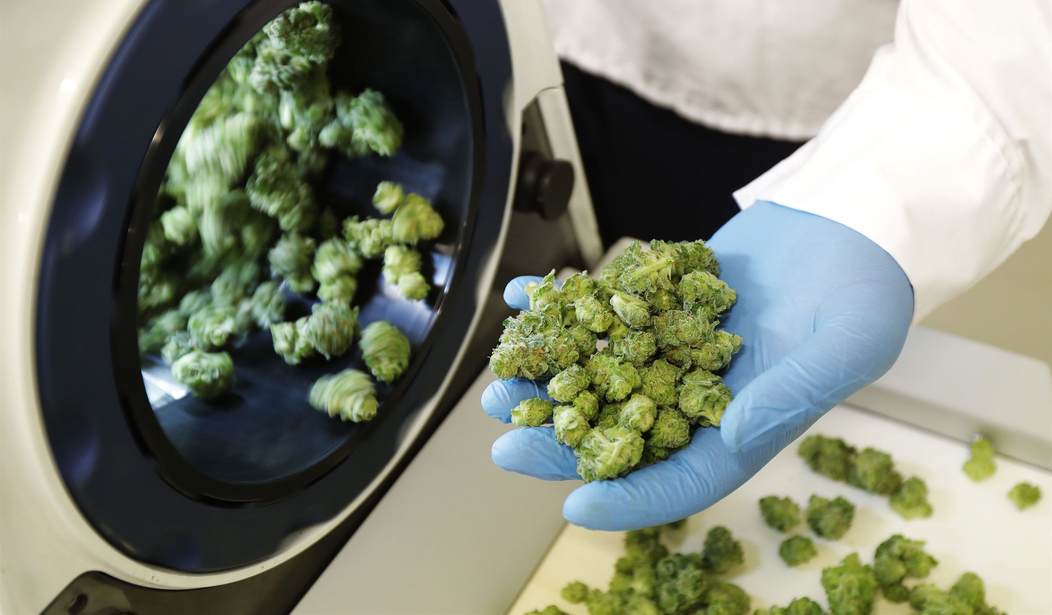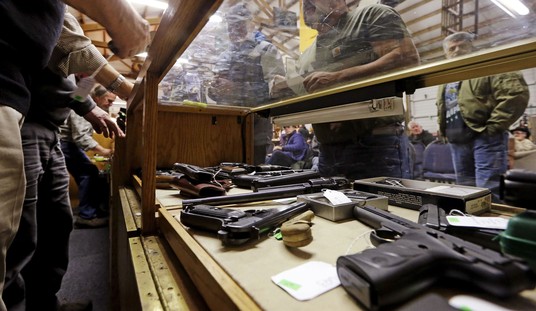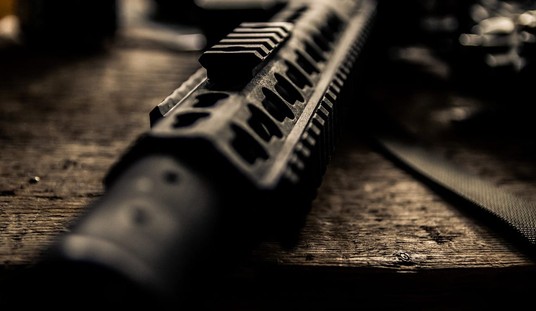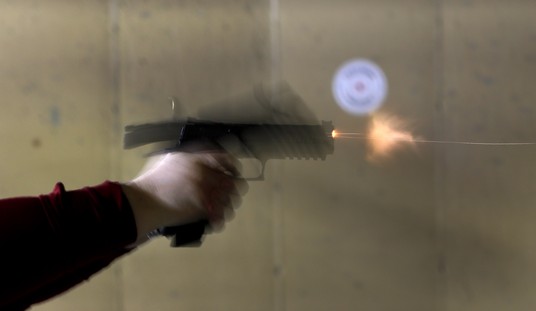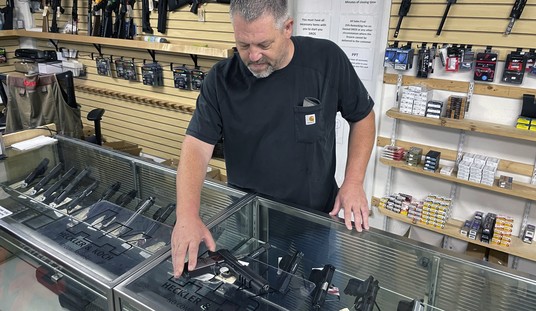A New York man's attempt to comply with state law turned into a Kafka-esque nightmare thanks to the conflict between federal drug laws and the state's medical marijuana statutes. And what happened to Mark Humphreys could easily happen to hundreds of thousands of gun owners, who, like him, live in states that are forcing gun owners to choose between their health and their right to keep and bear arms.
Humphreys obtained a medical marijuana card in New York so he could use cannabis to help him deal with the side effects of his treatment for Stage IV prostate cancer. Humphreys also possessed a valid pistol permit in Nassau County, but when he and his girlfriend moved to nearby Suffolk County they had to re-register their firearms... and that's when the trouble began.
On the Suffolk County Police Department’s pistol license transfer form, Humphreys answered the question of whether he's utilized any illegal substances, admitting to previously smoking medical marijuana as part of his cancer treatment.
That’s when he learned that Suffolk had rejected his transfer application and that both he and his girlfriend would have to surrender their firearms because of Humphreys' state-issued medical marijuana card.
Marijuana is legal in New York, both recreationally and medically, while an estimated 20% of residents across the state have at least one firearm, according to a 2020 study.
But a 2011 federal regulation continues to prohibit anyone from legally owning a gun, if that person has disclosed that they use a controlled substance — a category that still includes cannabis.
Humphreys ultimately got his pistol license transferred — by agreeing to cancel his medical marijuana card, although Suffolk police now concede, after inquiries from Newsday, that the investigator's original decision was incorrect.
Months after the ordeal, however, he remains frustrated and aggravated with a system that treats legal marijuana more harshly than alcohol or most opioids — the usage of which would not disqualify someone from legally obtaining a gun.
“I’m disappointed that Suffolk County would withhold pistol licenses from law-abiding citizens,” Humphreys said. “ … That was a lot of aggravation for nothing. I hope that in the future other law-abiding citizens don't have to go through this.”
Frankly, I'm shocked and pleasantly surprised that Suffolk County officials have admitted they made a mistake in denying his pistol permit based solely on his cannabis use, especially since the licensing officials could credibly claim they're just trying to comport with federal law. The Suffolk County police, however, told Newsday that a medical marijuana card should not serve as a disqualifier, and that the licensing official who denied Humphreys' permit was in error.
“A background check is required to hold a pistol license in Suffolk County,” a department spokesperson said in an emailed statement. “As part of the check, all applicants are required to provide medical documentation from a doctor if they are using prescription medication, which includes medical marijuana. While an arrest for possession or sale under existing penal law offenses could disqualify an applicant, an applicant or their household member's use of medical marijuana would not be a reason to deny the application.”
The department said it does not maintain statistics on how many applicants have had their permits rejected because of marijuana usage.
Multiple experts contacted by Newsday said they're unaware of any other New York municipal police force rejecting a pistol license application because of medical marijuana usage.
Just because "experts" are unaware doesn't mean it isn't happening. After all, most denials or permit revocations don't get any news attention at all, so it wouldn't surprise me if there are other cases like Humphreys flying under the radar. We know that the ATF has certainly taken an interest in the conflict between state and federal law. The agency is actively challenging an Arkansas statute that allows concealed carry holders to bypass a NICS check when purchasing a firearm, which the ATF says allows medical marijuana cardholders to illegally purchase firearms.
The law in question is Act 757 of 2023, sponsored by state Rep. Aaron Pilkington (R-Knoxville). The measure changed state law to prevent the Arkansas State Police from disqualifying cardholders and to prevent the state Department of Health from telling State Police who the cardholders are.
Pilkington said he sponsored the bill after hearing from constituents. One, Pilkington said, pointed out that a prescription for Percocet, a prescription pain reliever, does not disqualify anyone from legally owning a gun.
“I never thought about it that way,” Pilkington said.
The medical marijuana restriction on gun ownership was hypocritical in Pilkington’s eyes. Some military veterans use medical marijuana to treat post-traumatic stress disorder, he said, but the law prevented them from “enjoying some of the liberties that they fought for.”
Pilkington wasn’t sure how the bill would be received by his legislative colleagues, joking that Republicans might hate it because it was a marijuana bill and Democrats might hate it because it was a gun bill. In the end, the bill was pretty popular with members of both parties, passing the House 82-5 and passing the Senate 26-3. Republican Gov. Sarah Sanders signed the bill into law.
In October, the ATF chimed in on the new law. Marijuana is a Schedule I controlled substance and anyone who uses it is “prohibited by federal law from possessing firearms and ammunition,” its letter said.
Joan Shipley, a lawyer for the Arkansas State Police, said Arkansas can’t ensure that all of the state’s concealed carry handgun license holders and applicants are not controlled substance users because the application for the license doesn’t ask if the applicant holds a medical marijuana card. Shipley also said an applicant can’t be considered a chronic controlled substance abuser solely based on whether the person is a medical marijuana patient.
Arkansas isn’t the only state at an impasse with the ATF over discrepancies between state and federal law on cannabis and guns. Minnesota, Florida, Oklahoma and Mississippi are among the states that have passed laws to protect medical marijuana patients’ Second Amendment rights.
If and when the DEA officially reschedules cannabis as Schedule III, that should end the current conflict between medical marijuana and the right to keep and bear arms. But that could still be a year or more away, and in the meantime, medical marijuana users are still at risk of being forced to choose between their Second Amendment rights and their health.
My wife, who's been battling lung cancer for eight years now, will go back on chemotherapy for the first time in several years next week. She and I have actually had conversations about whether she should get her Virginia medical marijuana card so she could have something to help her deal with the nausea, loss of appetite, and general cruddiness that she's going to be subjected to, but even if she did take that step she still wouldn't be allowed to maintain possession of her firearms, so what's the point?
Humphreys says he's not using currently using marijuana, even though he could purchase it from a recreational dispensary without having to obtain a medical marijuana card. That might be a workaround when it comes to applying for a pistol permit on Long Island, but it doesn't change the fact that the ATF considers any marijuana use to be illegal, no matter the law in the state where you live. The Supreme Court has the chance to undo the agency's current policy in a case called U.S. v. Daniels, but after last week's decision in Rahimi it's an open question as to whether five justices on the Court are ready to defend the Second Amendment rights of "unlawful" users of medical marijuana.

